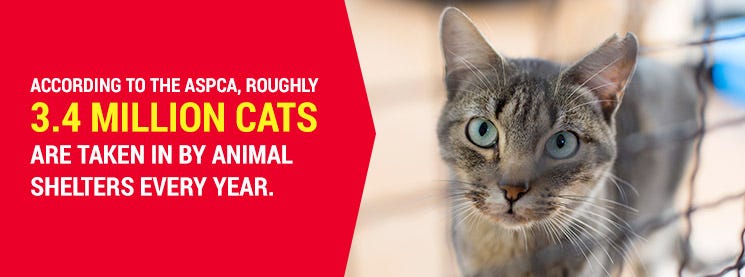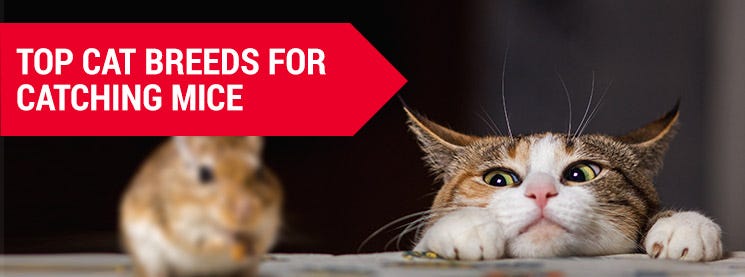How Much Money Do You Save by Breeding Mice to Feed Your Cats
Chances are good you don't ferry spices and silks on ships from the Old World to the New, so maybe you don't need a cat to keep your lower decks free from pesky mice. Still, no matter where you live in the United States, you're bound to encounter one of our smaller mammalian friends at one time or another. To catch them, you need a qualified hunting cat.
How to choose the right one? There are many cat breeds out there — almost too many to choose from, if we're being honest. Still, several breeds rise above the rest when it comes to sharpness of wits — and claws!

We're going to take you on a tour through the top 10 cats for catching mice. First, let's have a look at the basics.
Cats and Mice: It's Complicated.
Do cats eat mice? It probably sounds like a simple enough question, but the truth is many people don't know what their cat gets up to when it's out in the yard.
For some of us, the deeply ingrained hunting instinct of our favorite four-legged friends doesn't become apparent until they suddenly leave a dead animal in our shoes or on the front porch. After that, they have some explaining to do!
Meanwhile, some of us know only too well that cats kill mice — but the question stands. Do they actuallyeat them?
The answer isyes and no, but mostlyno. Cats are capricious and even joyous creatures, losing themselves entirely in the thrill of the hunt. They'll spend an entire afternoon stalking their prey if they can — but sometimes they have no intention of actually eating the objects of their hostility.
You have to remember cats were domesticated roughly 10,000 years ago, which means they have thousands of years of highly developed hunting instincts. For human beings, becoming an expert on a subject is thought to take some 10,000 hours of practice, and that means that the genetic memories stored up in a cat's DNA can be terribly difficult to ignore.

There are several reasons cats hunt and kill, but don't always eat, their quarry, such as:
- Out in nature, mother cats must teach their offspring how to hunt for their own food. Your cat may actually be trying to teach you how to provide for yourself.
- Sometimes, the reasons are simpler. Cats are both inquisitive and excitable, and they'll give chase to almost anything. Trouble is, they're not always the best judge of their own strength and sometimes kill their prey by mistake.
- If a strange cat has been leaving gory little presents by your front door, they may have been left there as an offering. Some cats who live out in the wild have been known to bring trophies to strangers' homes in the hopes of being taken in.
How to Choose the Right Cat for Hunting Mice
Before we get into the nitty gritty of choosing a perfect hunting cat, know you won't always have a choice when it comes to breed.
According to the ASPCA, roughly 3.4 million cats are taken in by animal shelters every year. That presents a huge problem for these shelters, which are often understaffed and underfunded. For this reason, we encourage you to visit an animal shelter if you're thinking about bringing a new cat into the family. At least look at these needy animals before you decide to purchase a kitten of one specific breed or another.

There's a very good chance you'll still have a rich selection to choose from if you limit yourself to rescued cats who need a loving home. You may be able to spot distinct breeds and make your selection from markings and body type.
Still, even without the telltale signs of distinctive, breed-specific markings, there are still a number of criteria you can use to make your selection:
Demeanor: The demeanor of the cat in question will tell you quite a lot about its hunting instincts. Does it seem generally aware of its surroundings? Is it easy to get its attention? If so, you might be looking at an excellent mouser or ratter. Cats sometimes have a tendency to come across as disinterested and aloof, but the truth is a little more complicated. The cats with the most finely tuned instincts will actually be quite attentive, with their ears constantly swiveling and their trained eyes always ready to spot a new target.
Behavior: Watch the cat's behavior. You'll be able to tell with little doubt whether it has finely tuned hunting instincts. Even if they don't act on it, strong hunters will watch every movement with interest. They'll track your hand or a piece of lint as it blows by, and you might even get a sense that they're watching those roughhousing children out of the corner of their eye.
While you can pick up on some of their hunting instincts, sometimes they need a helping hand to bring them to the fore. Play with the cat a bit with a laser pointer or an aluminum foil ball. If it gives chase, you know it won't take long for it to become a mouse hunting machine.
Origin: Sometimes you'll be able to tell, or be told, where a particular rescue came from. Maybe it grew up on a farm or was discovered wandering the street. In some cases, the origin story of a particular cat might make it more suited to outdoor living rather than indoors. If you find a cat that has a history of living where mice and rats have a tendency to congregate, it probably grew up hunting smaller prey and could be a valuable mouse hunting asset.

Whenever possible, try to spend some time with any of the cats you're considering bringing into the family — particularly if you have small children. Some of the cats you'll encounter will have strong hunting instincts but won't be particularly personable. Others will have the opposite combination of traits. Others still will have a highly prized combination of both. Take your time. You're not just adopting a mouser. You're searching for a friend.
The 10 Best Cat Breeds for Catching Mice
Finally, the moment you've been waiting for. If you have your heart set on a particular breed of cat, but you also want one that can help out with your rodent troubles, these are the 10 cat breeds you'll want to consider. Some of them are more charismatic and personable than the others, but all of them have hunting skills developed over the course of thousands of years.

- Persian
As far as cats go, Persians can be deceptive. They're a favorite among cat show enthusiasts and have been since the 1800s, but they have a lackadaisical way about them. They're sometimes affectionately called "furniture with fur." Still, it would be wrong not to include this popular brand on our list. Persians are known for their higher-than-average intelligence, and the females of the breed are particularly gifted when it comes to catching mice.
- Japanese Bobtail
Their name is a bit deceiving. Japanese Bobtails originally came from Korea. They were bred specifically as hunting cats, helping silk factories keep the mouse population at bay. Like several other cat breeds throughout history, the Japanese Bobtail was considered a sacred animal back home. Modern cat owners appreciate this feline breed because it's good company for adults and children alike. They even play in the water sometimes.
- Turkish Angora
We continue our world tour of cat breeds with the Turkish Angora, which hails from the nation of Turkey. Unlike several others on our list, the Turkish Angora is a breed that occurs in nature, rather than having been bred. This is a graceful, sure-footed breed, possessing both intelligence and apparent street smarts. They bond well with most people, delight in earning their owners' affections and, of course, are excellent hunters.
- Manx
The Manx is a breed that hails from the Isle of Man, a tiny, self-governing island that lies between Ireland and England. It has always been a popular breed for those who make their living at sea. The Manx is a skilled hunter, both aboard ships and back on dry land. When the breed made its stateside debut, it gave up its seafaring ways and became a favorite among farmers who needed help keeping rodents and other pests away from their valuable crops.
- Burmese
More than most of the other breeds featured here, Burmese cats have a habit of thinking with their stomach. They thrive anywhere they can be assured of a nice square meal, such as bookshops, homes or even office environments. In return, they'll let you keep their mouse-hunting abilities on retainer. Burmese cats are also intelligent and highly entertaining, which make them the perfect choice for an environment that plays host to children.
- Chartreux
It might have a funny name, but the Chartreux breed has been a favorite for many long centuries. French literature in particular has been fond of this breed, and it's been featured in books for both the young and the old for a very long time. They're also a muscular breed and are born hunters. They'll throw everything they've got at a good game of fetch. When they're not engaging in the chase, you'll find them to be of calm temperament and cool demeanor.
- Siamese
Thai royalty spent many generations in the company of Siamese cats. In fact, when members of royal families passed away, their cat would take up residence in whichever temple their remains were interred in, and lived there in comfort and luxury among monks and members of the priesthood. Siamese cats were eventually bred to form the Burmese, Himalayan and Ocicat breeds, but the original Siamese is still a favorite mouser and ratter on multiple hemispheres.
- Siberian
You may already be familiar with the Siberian Husky, a popular and charismatic canine breed that hails from the world's colder climates. It turns out the cat world has a Siberian breed of its very own. These are big cats. They can weigh up to 20 pounds, due in part to their thick coats. Having grown up in Russia, Siberia and other wintry European countries, their size and plush coats are no surprise — but they complement these qualities with grace and agility that are surprising given their size.
- Maine Coon
That's right, the Maine Coon is named after the U.S. state. This breed has existed on this continent for almost as long as the United States has existed, and they have been held in high regard as mousers ever since the colonies took root here. They're also one of the largest domesticated cat breeds and are easily recognizable by their long, luxurious and water-resistant fur. Some cat experts believe this breed was brought over on sailing ships, where their coats would have been a blessing on the rain-soaked planks.
- American Shorthair
American Shorthairs have a long and storied career. They've lived alongside humans for roughly three centuries and were originally brought to the United States from Great Britain. Urban legend has it there were Shorthairs on the Mayflower, helping the incoming pilgrims keep the mice out of the food stores. In addition to their hunting abilities, Shorthairs are also quite affectionate, and for those two reasons they deserve the top spot in our cat breeds rundown.
Check out our guide on how to train your cat to hunt mice.
A Cat That Brings Home the Bacon
We've spent a lot of time talking about how to choose the perfect cat for hunting down troublesome mice and rats, but the question remains. How can you take the best care of your hunting cat?
It's actually pretty simple. Make sure you keep them up-to-date on all of their vaccinations,especially if they spend a great deal of their time outside hunting. Rodents such as mice, rats and voles have a tendency to carry diseases and parasites.
Also, be sure you're not using pesticides or chemical-based rodent control products around your property. Your cat can come into contact with these chemicals and become ill. Stick to natural products.
Other than these basic tips, your cat should be fairly self-sufficient. It's still a cat, after all.
We hope you've enjoyed this look at the best cats for catching mice. If you've thought about adding a hunting cat to your household to keep the pest population down, these are the top breeds you'll want to consider. Remember, when all else fails, if your cat isn't pulling its weight at home and you need a helping hand with mouse control, you can always trust one of Victor's humane and easy-to-use traps to get the job done.
While you're here, remember to sign up for our e-newsletter so you can stay up to date with all of our tips, tricks, and colorful insight into the animal kingdom.
Source: https://www.victorpest.com/articles/top-cat-breeds-for-catching-mice
0 Response to "How Much Money Do You Save by Breeding Mice to Feed Your Cats"
Post a Comment